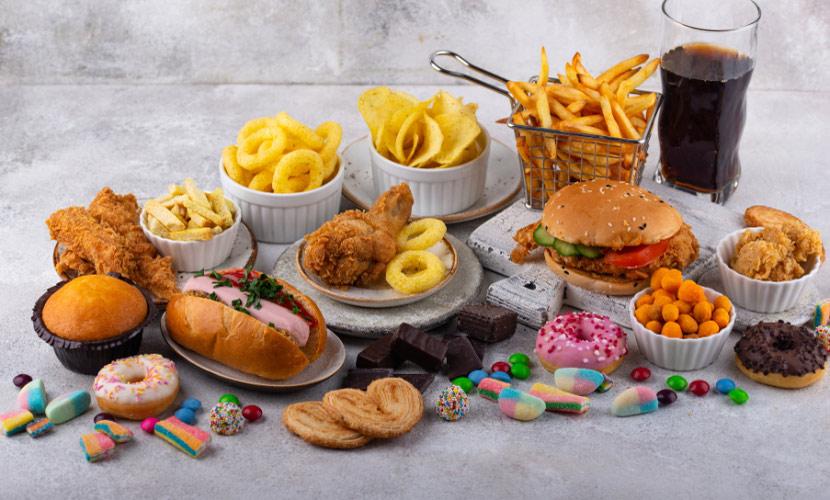🔥 Hot Days, Cool Meals – 20% Off on 4-Week Plans Only! 🔥
CODE: VM20

11 Reasons for Unexplained Weight Gain
Gaining Weight for No Reason: 11 Underlying Causes and Solutions
Just a small slip from your strict diet and exercise routine, and suddenly your weight jumped 2 kgs. Is this the case with you? And, you can't help but wonder, "Why do I gain weight so fast?"
Don't worry! You are not alone. Many people who stay loyal to their exercise and diet, struggle with sudden weight gain. It's a frustrating feeling and often the primary reason for people to give up on weight loss practice.
It may seem like there is no good reason for weight gain because the science behind weight loss is simple. You drink and eat lesser calories than you burn throughout the day, which creates a calorie deficit and eventually helps with weight loss. However, experts say several reasons can cause weight gain that you may overlook.
Consistent efforts that you put in for exercise and diet still hold prime importance for weight loss. However, if you are experiencing weight gain even after consistent efforts, then you may need to consider these 11 reasons that make you gain weight faster.
Our health experts have tried to uncover some of the most common reasons why you gain weight fast but lose so slowly.
11 causes that make you gain weight fast
Food shopping on a hungry stomach
A hungry stomach never reaches out to slices of cucumbers. That is why nutritionists suggest starving yourself for weight loss never works. When you go shopping with a hungry stomach, you get tempted to buy junk foods like cookies, cakes, chips, etc.
Solution: Eat a snack before you head out for shopping. If you are going grocery shopping, make a list of items you want to purchase. Moreover, abstain from going to the junk food sections.
Improper portioning of food
Portion size is the foundation of your weight loss diet. Even the most low-calorie food may become unhealthy when over-indulged. Nutritious foods like avocados, nuts, peanut butter, etc., are calorie-dense and can lead to weight gain if eaten in excess.
Many people follow a small-meal diet, consuming small-portioned meals rather than three large meals. You start questioning yourself, why do I gain weight when I eat less? You may be eating too many small meals that add up and make your daily diet calorie-rich.
When the number of meals goes beyond 6-8, it may have a reverse effect. Every time you eat, your body releases insulin to stabilize the sugar from getting absorbed. Insulin which is a fat-storing hormone gets triggered to store more fat every time you eat.
Solution: While prepping, portion your meal according to your fitness goals. Make sure you balance all the macronutrients like complex carbohydrates, protein, fiber, and healthy fats. If you feel a smaller meal diet is not working for you and you are gaining weight, go back to 3-4 meals and control your portion. This will make you feel fuller and prevent you from snacking frequently.
Not eating enough fiber
Healthy fibers are important to keep away sudden hunger pangs and help you maintain a healthy weight. Fiber plays multiple functions in your body—easy bowel movement, maintaining a healthy gut biome, and feeling fuller. Since fiber does not get digested in your body, it adds very few calories to your system.
Solution: Try to incorporate more fiber-rich food in your meal plan. Fiber means not just salads. Whole grains, fruits, beans, etc., provide enough fiber. Food items that contain high fiber are naturally low in calories and high in water.
You are dehydrated
Substituting water with other calorie-rich beverages also causes weight gain. It applies to healthy drinks as well. A single glass of fruit juice contains lots of sugar and lacks the necessary fiber. Avoid dehydration and get adequate water and healthy beverages.
Solution: According to health experts, you need to drink 2-3 liters of water a day. You can replace a few glasses of water with healthy beverage options.
Skipping breakfast
While you may not need to stuff yourself up early in the morning, skipping breakfast can make you hungrier and force you to grab easy eating options. Studies say skipping breakfast cause people to nibble nonstop by lunchtime. And down goes all your weight loss efforts.
Solutions: Breakfast provides the necessary fuel that gives you a healthy energy boost at the start of the day. Have a protein-rich breakfast along with some fruits. The fruits will provide natural sugars and fiber that make you feel fuller for a long time.
Consuming lots of salts

High sodium causes water retention in the body. It is one of the primary causes of weight fluctuations in adults. Remember feeling bloated after a generous serving of fried chicken and mayo sauce? Even the high salt in your so-called packaged diet food can cause water retention. Fortunately, the weight gained by a high-sodium diet is easy to lose.
Solution: Increase your water intake and cut back on sodium. Cooking more at home or ordering food from a healthy meal delivery Dubai can cut back on excess salt. Check the labels of the processed food before you put them in your cart.
Storing junk food at home
You can't ask your family to go on a diet along with you. Most of us have the habit of storing ice cream, chips, processed food, baked goodies made from refined flour, etc., in our kitchen pantries. Just knowing that junk food is within your reach can derail your healthy diet plan.
Health experts say the possibility of consuming junk food increases significantly if unhealthy food is easily accessible.
Solution: The best way to overcome cravings for junk food is to keep your favorite junk food out of the house. If you can't do that, make small packets of junk food and store them in a separate place. So, when you get hit by passing cravings, have a small portion of your favorite junk food. However, it's your willpower that helps you make smarter choices to reduce calorie intake.
You are stressed

Stress and eating habits are related and it is not good for weight loss. Apart from creating physiological obstacles to weight loss, stress also affects your mental health. When you are stressed, your cortisol levels go up, which may lead to weight gain.
Emotional strain can make you crave calorie-rich comfort food. Moreover, it affects your sleep. A good night's nap is not only important for your physical and mental health but also for your weight loss. Studies have shown that poor slumber is one of the most common factors for obesity. Even children having poor sleep patterns have a greater risk of developing obesity.
Solution: There are various stress management techniques. Eat food that uplifts your mood. Edibles like beans, brown rice, and whole wheat bread contain serotonin-boosting complex carbs. Avoid calorie-rich eatables that may boost your temperament for a short duration, and once the sugar rush wears off, you feel terrible again. Indulge in a healthy hobby and spend time with your friends. If you are still feeling depressed or strained, seek medical help.
You are losing but not realizing
The initial weeks of your weight loss journey are nothing less than euphoric. You shed the first few kilos without much effort and then comes the weight loss plateau. Before you lose your calm, understand it is incredibly common.
After a few weeks of steady weight loss, you may experience your weight stuck at a number. One of the most common reasons is that you are still losing fat but gaining lean muscle mass.
Solution: Step down from your weighing scale and try alternative ways to check your progress. Measure your waist. If you are losing inches, then do not fret about weight.
Lack of protein in the diet
Protein is one of the essential macros for losing weight. Protein not only boosts metabolism by 80-100 calories but makes you eat lesser by boosting satiety. Healthy proteins also reduce cravings and curb your desire for frequent snacking. Some studies have found that protein changes the level of weight-regulation hormones like ghrelin and leptin.
Solution: Load up your breakfast with protein. Have at least one protein-rich food at each meal. You can add protein to your smoothies and other drinks. Vegetarians and vegans can add several plant-based proteins to their daily diet.
Medical condition
Several medical conditions like hypothyroidism and PCOS in women can make weight loss much harder. Certain medications may also lead to weight gain—or even make your body resistant to slimming.
Solution: If your weight gain happened after you started taking some medicines, talk to your doctor. Your doctor can advise you on alternatives.
Bottom line
Your body is designed to conserve energy. When you rob your body for extra calories, it may see it as a threat and start storing more fat. Only your consistency and commitment to weight loss can break this plateau or stop sudden weight gains.
However, simply cutting calories may not help you in steady weight reduction. A healthy weight management plan consists of 80% food and 20% exercise. You need to focus more on eating the right food that promotes slimming.
Carefully plan your weight reduction meal plan. Don't restrict yourself beyond a level that you starve and later devour anything that comes along your path. Train your brain to eat healthy and have a healthier outlook in general that puts you on a more sustainable weight loss track.
If you are facing any issues in devising a weight-loss strategy, seek professional counseling. Our nutritionist can help create a customized weight-loss meal plans in Dubai for you.
Reach out to start your fitness journey with us!
Meal Plans
Delivery Details
Legal Information
© 2020-2024 VMeals. All rights reserved. VMeals™ is a trademark of Flip Side Restaurant and Cafe L.L.C
We accept
